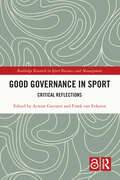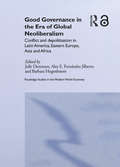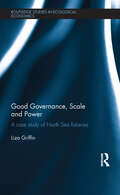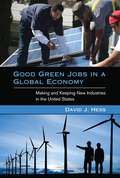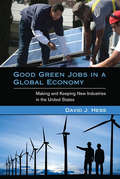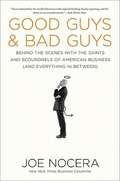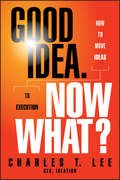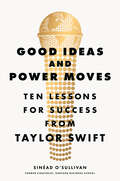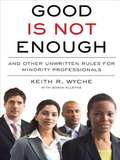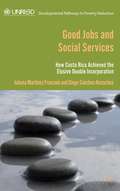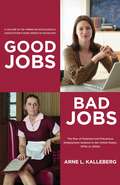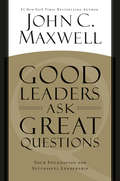- Table View
- List View
Good Governance in Sport: Critical Reflections (Routledge Research in Sport Business and Management)
by Arnout Geeraert Frank Van EekerenThis book fills an important gap in the sport governance literature by engaging in critical reflection on the concept of ‘good governance’. It examines the theoretical perspectives that lead to different conceptualisations of governance and, therefore, to different standards for institutional quality.It explores the different practical strategies that have been employed to achieve the implementation of good governance principles. The first part of the book aims to shed light on the complexity and nuances of good governance by examining theoretical perspectives including leadership, value, feminism, culture and systems. The second part of the book has a practical focus, concentrating on reform strategies, from compliance policies and codes of ethics to external reporting and integrity systems. Together, these studies shed important new light on how we define and understand governance, and on the limits and capabilities of different methods for inducing good governance.With higher ethical standards demanded in sport business and management than ever before, this book is important reading for all advanced students and researchers with an interest in sport governance and sport policy, and for all sport industry professionals looking to improve their professional practice.The Open Access version of this book, available at www.taylorfrancis.com, has been made available under a Creative Commons Attribution-Non Commercial-No Derivatives 4.0 license.
Good Governance in the Era of Global Neoliberalism: Conflict and Depolitization in Latin America, Eastern Europe, Asia and Africa (Routledge Studies in the Modern World Economy)
by Barbara Hogenboom Jolle Demmers Alex E. Fernāndez JilbertoThis new collection critically examines the new global policy of 'good governance'. This catchphrase of aid policy and development thinking has been the subject of too little analysis to date. This book redresses the balance. It places the prefix 'good', and exactly what that means, under the microscope and examines the impact of neoliberal governance in a wide range of countries and territories, including Chile, Russia, Argentina and Indonesia.
Good Governance, Scale and Power: A Case Study of North Sea Fisheries (Routledge Studies in Ecological Economics #29)
by Liza GriffinIn recent years there have been several alarming predictions about the future of the planet’s fish stocks. As a result, many national governments and supranational institutions, including the European Union, have instituted reforms designed to mitigate the crisis. This book examines the discourse and practice of ‘good governance’ in the context of fisheries management. It starts by examining the ‘crisis’ of fisheries in the North Sea, caused primarily by overfishing and failure of the European Union’s Common Fisheries Policy. It then goes on to analyse reforms to this policy enacted and planned between 2002 and 2013, and the proposition that collapse of fish stocks could occur as a result of deficiencies in new governing arrangements, i.e. failure to apply ‘principles of good governance’. The book argues that impediments to good governance practice in fisheries are not merely the result of implementation deficits, but that they constitute a more systematic failure. Governance theory addresses issues of power, but it does not recognise the many important spatially contingent and relational forms of power that are exercised in actual governing practice. For example, it frequently overlooks spatial practices and strategies, such as ‘scale jumping, ‘rescaling’ and the discursive redrawing of governing boundaries. This book exposes some of these spatial power relationships, showing that the presence of such relationships has implications for accountability and effective policymaking. In sum, this book explores some of the ways in which we might better understand governance practice using theories of scale and relational concepts of power, and in the process it offers a critique and rethinking of governance theory. These reflections are made on the basis of an in-depth case study of the attempted pursuit of ‘good governance’ in the European Union via institutional reforms, focusing particularly on the thorny and fascinating case of North Sea fisheries management.
Good Governance: The IMF's Role
by International Monetary FundA report from the International Monetary Fund.
Good Green Jobs in a Global Economy
by David J. HessGood Green Jobs in a Global Economy is the first book to explore the broad implications of the convergence of industrial and environnmental policy in the United States. Under the banner of "green jobs," clean energy industries and labor, environmental, and antipoverty organizations have forged "blue-green" alliances and achieved some policy victories, most notably at the state and local levels. In this book, David Hess explores the politics of green energy and green jobs, linking the prospect of a green transition to tectonic shifts in the global economy. He argues that the relative decline in U. S. economic power sets the stage for an ideological shift, away from neoliberalism and toward "developmentalism," an ideology characterized by a more defensive posture with respect to trade and a more active industrial policy. After describing federal green energy initiatives in the first two years of the Obama administration, Hess turns his attention to the state and local levels, examining demand-side and supply-side support for green industry and local small business. He analyzes the successes and failures of green coalitions and the partisan patterns of support for green energy reform. This new piecemeal green industrial policy, Hess argues, signals a fundamental challenge to anti-interventionist beliefs about the relationship between the government and the economy.
Good Green Jobs in a Global Economy: Making and Keeping New Industries in the United States (Urban and Industrial Environments)
by David J. HessAn examination of the politics of green jobs that foresees a potential ideological shift away from neoliberalism toward “developmentalism.”Good Green Jobs in a Global Economy is the first book to explore the broad implications of the convergence of industrial and environnmental policy in the United States. Under the banner of “green jobs,” clean energy industries and labor, environmental, and antipoverty organizations have forged “blue-green” alliances and achieved some policy victories, most notably at the state and local levels. In this book, David Hess explores the politics of green energy and green jobs, linking the prospect of a green transition to tectonic shifts in the global economy. He argues that the relative decline in U.S. economic power sets the stage for an ideological shift, away from neoliberalism and toward “developmentalism,” an ideology characterized by a more defensive posture with respect to trade and a more active industrial policy.After describing federal green energy initiatives in the first two years of the Obama administration, Hess turns his attention to the state and local levels, examining demand-side and supply-side support for green industry and local small business. He analyzes the successes and failures of green coalitions and the partisan patterns of support for green energy reform. This new piecemeal green industrial policy, Hess argues, signals a fundamental challenge to anti-interventionist beliefs about the relationship between the government and the economy.
Good Growth: How Brands Win with Social Impact
by Omar Rodriguez Vila Sundar BharadwajBusiness has a sustainability problem—and sustainability has a business problem, as many companies are fearful of engaging with social and environmental issues, owing to the costs and risks.Addressing these dual challenges head on, this book provides a blueprint for putting social and environmental benefits at the center of a company’s growth agenda. Many sustainability books offer 30,000-foot strategic views and broad-brush guidance on the business of “doing well by doing good,” but here is a ground-level guide for profitably integrating social and environmental benefits into individual products and brands. The book introduces the rapidly emerging phenomenon of social impact markets and shows how companies can capitalize on these new pockets of consumer demand through focused strategy, data-informed implementation, and a clear eye on the future, including how digital technologies are creating new ways for brands to expand their social impact and make social mission a central element of competitive strategy.Weaving together rich case studies and practical tools, this research-backed and real-world-ready guide fills a critical niche: a hands-on strategy playbook for the executives charged with driving brands’ top-line growth, making it essential reading for C-suite leaders, R&D, product, and brand managers, board members, NGOs, as well as MBA and executive education students.
Good Guys and Bad Guys
by Joe NoceraWhat's it like to be a top tobacco executive when your kid asks you about smoking? How did a young liberal arts major become the hottest tech-stock analyst of the '90s, and why did he self-destruct? How did one family's dysfunction change the media landscape? Some people think business journalism is all about balance sheets, income statements, and earnings per share. But if you want to answer the really interesting questions-about heroes and hucksters, visionaries and madmen, and other larger-than-life characters-you need a reporter like Joe Nocera. For more than twenty-five years Nocera has shed new light on the giants of the business world-Warren Buffett, T. Boone Pickens, Bob Nardelli-as well as on the less famous but equally fascinating. He builds stories around their motivations, personalities, and deepest characters. And instead of just pigeonholing them as good guys or bad guys, he explores the gray areas in between.
Good Guys and Bad Guys
by Joe NoceraThe greatest columns and profiles by the bestselling coauthor of All the Devils Are Here. What's it like to be a top tobacco executive when your kid asks you about smoking? How did a young liberal arts major become the hottest tech-stock analyst of the '90s, and why did he self-destruct? How did one family's dysfunction change the media landscape?Some people think business journalism is all about balance sheets, income statements, and earnings per share. But if you want to answer the really interesting questions-about heroes and hucksters, visionaries and madmen, and other larger-than-life characters-you need a reporter like Joe Nocera.For more than twenty-five years Nocera has shed new light on the giants of the business world-Warren Buffett, T. Boone Pickens, Bob Nardelli-as well as on the less famous but equally fascinating. He builds stories around their motivations, personalities, and deepest characters. And instead of just pigeonholing them as good guys or bad guys, he explores the gray areas in between.
Good Guys, Wiseguys and Putting Up Buildings: A Life in Construction
by Samuel C. FlormanGood Guys, Wiseguys, and Putting Up Buildings is an engaging memoir about one man's career in construction--rising to the top of an industry renowned for crime, corruption, violence, physical danger, and the chronic risk of financial catastrophe.Starting in the Navy Seabees at the end of WWII, Samuel C. Florman made his way as a general contractor in New York City through the period of explosive development, private exuberance and the historic growth of publicly supported housing--all amidst the rise of the notorious Mafia families, and evolution of the Civil Rights Movement. His storied career brought him into contact with a variety of personalities: politicians and civil servants, developers and technocrats, saintly do-gooders and corrupt rapscallions. Along with the rousing adventures there were satisfactions of a different sort: the enchantment of seeing architecture made real; the pride of creating housing, hospitals, schools, places of worship--shelter for the body and nourishment for the spirit.
Good House Hunting: 20 Steps to Your Dream Home
by Dennis Wedlick Philip LangdonWithout a doubt, the most important investment of your life will be your home. No other purchase will matter more to your lifestyle, financial future, and personal well-being. It is never too late or too soon to set a course for creating a home that will provide the maximum return and fulfill your dreams.With step-by-step instruction, Good House Hunting will take you on an inspirational and practical journey to finding your dream home -- both within your imagination and out in the real estate world.For home buyers, Good House Hunting will help you navigate the complex process of finding the property with the greatest potential.For home owners, Good House Hunting provides the framework to help you maximize your current property.For dreamers, Good House Hunting sets out the course for dream home planning, so when you are ready you will have a plan.If you long to discover what home would be a worthy investment for improving your fortunes and accomplishing your dreams, Good House Hunting is for you.
Good Idea. Now What?: How to Move Ideas to Execution
by Charles T. LeeProven pathways for taking ideas to implementation We all have ideas—things we want to do or create—but only some of us will do what it takes to see those ideas come to pass. In Good Idea. Now What? readers will discover some of the essential values and principles that guide successful idea-makers, including the leveraging of mixed environments for creativity, working through resistance and setbacks, developing a practical plan for implementation that works, navigating collaborative opportunities, and communicating your idea to make it truly remarkable. Whether you're just a creative type, or the leader of an organization, you must figure out a creative process and develop an infrastructure for implementing your ideas. Good Idea. Now What? offers systematic advice for moving your ideas to execution. It will show you: The fundamental elements of a good idea Tangible pathways to follow after initial inspiration The importance of branding and its impact on ideas Practical advice for developing a loyal tribe of supporters who will take your idea to a whole new level It's not enough to be inspired. Learn how to follow through on your ideas and discover how great an impact you can have!
Good Ideas and Power Moves: Ten Lessons for Success from Taylor Swift
by Sinéad O'SullivanA guide to the 10 power moves that have built Taylor Swift&’s superstardom and empire, from a former Strategist at Harvard Business School&’s Institute for StrategyTaylor Swift&’s genius is not limited to her singing and songcraft: as the founder of her own multi-billion dollar enterprise she has higher returns than 99.9% of hedge funds, and has built a stronger global corporation than nearly every other American conglomerate CEO. She is the only person that the US Federal Reserve and European Central Bank track with precision. She has a larger impact on the economy than most economists that have ever lived, and has done more for US antitrust law than any sitting member of Congress. There is a lot to learn from Taylor Swift. Global investment fund manager and former head of Strategy at HBS (and Swiftie!) Sinead O&’Sullivan taps into the same genius that sells out stadiums and shuts down the internet to give Taylor—the CEO, the strategist—the respect she deserves. O&’Sullivan sums up Swift&’s business savvy into ten big, teachable lessons, including:-Build a World (Not a Product): how to create value that is greater than the sum of its parts (or, how Taylor created the fan-centered Swiftverse that fosters community, belonging, and off-the-charts engagement) -Be Anti-Fragile: how to embrace volatility, build resilience, and thrive in uncertainty--when your competitors can't (or, how Taylor gamed the chaos of Covid shutdown to own the airwaves)-Don&’t Just Play the Game, Change It: how to rewrite the rules on your own terms when your chips are down (or, how Taylor almost lost control of her music catalog to Private Equity—but re-recorded all her masters and took them back)
Good Is Not Enough
by Wyche Keith R.A no-nonsense guide for minorities in business who want to make it to senior management In recent decades, corporate America has gotten better at recruiting minority talent. But despite their education and hard work, too many African Americans, Latinos, and Asian Americans still find unique obstacles on the path to senior management. And there are too few minority mentors available to help them understand and overcome these challenges. Keith R. Wyche, a division president at a Fortune 500 company, is the perfect mentor for ambitious minority businesspeople at all levels. His book is filled with thought-provoking insights and practical advice based on his own experiences and those of the many people he has counseled. He discusses the importance of: Understanding corporate culture-and the impact it has on your career Being visible-because you can’t get ahead if nobody knows who you are Staying current-why minorities must be continuous learners Good Is Not Enough also includes anecdotes from prominent CEOs such as Ken Chenault of American Express, Richard Parsons of Time Warner, and Alwyn Lewis of Kmart. .
Good Is the New Cool Guide to Meaningful Marketing: How Brands Can Win with Conscious Consumers
by Bobby Jones Afdhel AzizHow brands can evolve to win with conscious consumers The Good Is the New Cool Guide to Meaningful Marketing is your guide to future-proof your brand with purpose-driven strategies and activations that meet the demands of the new world of conscious capitalism. This book takes readers behind the scenes at some of the world's most famous brands—from purpose-driven pioneers like TOMS, the Honest Company, and Chobani, to household names like Oreo, Call of Duty, and Brand Jordan—to show you how a new wave of marketers are collaborating with values-driven creators of cool like Pharrell, Lady Gaga, and Justin Bieber. In this book, readers will learn about: How brands can authentically discover and deploy their social purpose in ways that drive brand love and financial growth The Seven Steps of Meaningful Marketing, including “Think Citizens Not Consumers,” “Solve Problems from the Everyday to the Epic,” and “People are the New Media” How brands can collaborate with nonprofits to make money and do good at the same time, using examples from Product(RED), Rivet, and Choose Love The Good Is the New Cool Guide to Meaningful Marketing earns a well-deserved spot on the bookshelves of all forward-thinking leaders in business, from startups to Fortune 500 companies, seeking to ride the winds of change and market in a better, more meaningful way.
Good Is the New Cool Guide to Personal Purpose: Designing a Meaningful and Prosperous Career
by Bobby Jones Afdhel AzizHow to Supercharge Your Career with Purpose and Impact At a time when employee engagement has never been lower, the Good Is the New Cool Guide to Personal Purpose: Designing a Meaningful and Prosperous Career helps employees bring their full selves to work by helping them discover and use their personal Purpose to fuel their careers. This can lead to higher levels of physical, emotional, and mental health, as well as huge benefits to organizations in the form of higher levels of engagement, innovation, recruitment, and retention. This book explores the ground-breaking GPS to Purpose framework for finding Personal Purpose, helping readers pinpoint their Gifts, Passions, and how they can be of Service to others, and in the process drive business growth through solving social and environmental problems. With ideas applied at Fortune 500 companies like Adidas, PepsiCo, Microsoft, and others, this book discusses topics including: Explaining what Personal Purpose is in a clear and accessible way Unpacking the many mental, physical, and financial benefits of finding Purpose How to unleash your inner ‘Intrapreneur’ at work How to write an inspiring Living Vision for your life—and your work The Good Is the New Cool Guide to Personal Purpose earns a well-deserved spot on the bookshelves of all employees seeking to design a career that is both meaningful and successful—and help them drive growth in an entrepreneurial way through solving social and environmental problems.
Good Is the New Cool: Market Like You Give a Damn
by Bobby Jones Afdhel Aziz"We are at a crossroads: either we can try to prop up the old, broken marketing model, or we can create a new model, one that is fit for the unique challenges of today." --From Good Is the New CoolMarketing has an image problem. Media-savvy millennials, and their younger Gen Z counterparts, no longer trust advertising, and they demand increased social responsibility from their brands--while still insisting on cutting-edge products with on-trend design. As always, brands need to be cool--but now they need to be good, too. It's a tall order, and with new technology empowering consumers to bypass advertisements altogether, it won't be long before the old, advertising-based marketing model goes the way of the major label. If only there was a new model, one that allowed companies to address environmental, civic, and economic issues in a way that grew their brand and business, while giving back to society, and re-branding branding as a powerful force for good. Enter Good is The New Cool, a bold new manifesto from marketing experts Afdhel Aziz and Bobby Jones. In provocative, whip-smart, and streetwise style, they take aim at conventional marketing, posing the questions few have had the vision and courage to ask: If the system is broken, how can we fix it? Rather than sinking money into advertising, why not create a new model, in which great marketing optimizes life? With seven revolutionary new principles--from "Treat People as Citizens, Not Consumers," to "Lead with the Cool"--and insights and interviews from a new generation of marketers, social entrepreneurs, and leaders of such brands as Zappos, Citibank, The Honest Company, as well as the culture creators working with artists like Lady Gaga, Pharrell, and Justin Bieber, this rule-breaking book is the new business model for the twenty-first century, and a call to action for anyone committed to building a better tomorrow. This visionary book won't just change your business--it will change the world.
Good Italy, Bad Italy
by Bill EmmottNot long ago Italy was Europe's highly touted emerging economy, a society that blended dynamism and super-fast growth with a lifestyle that was the envy of all. Now it is viewed as a major threat to the future of the Euro, indeed to the European Union as a whole. Italy's political system is shorn of credibility as it struggles to deal with huge public debts and anemic levels of economic growth. Young people are emigrating in droves, frustrated at the lack of opportunity, while older people stubbornly cling to their rights and privileges, fearful of an uncertain future. In this lively, up-to-the-minute book, Bill Emmott explains how Italy sank to this low point, how Italians feel about it, and what can be done to return the country to more prosperous and more democratic times. With the aid of numerous personal interviews, Emmott analyzes "Bad Italy"—the land of disgraced Prime Minister Silvio Berlusconi, an inadequate justice system, an economy dominated by special interests and continuing corruption—against its contrasting foil "Good Italy"—the home of enthusiastic entrepreneurs, truth-seeking journalists, and countless citizens determined to end mafia domination for good.
Good Jobs America
by Paul Osterman Beth ShulmanAmerica confronts a jobs crisis that has two faces. The first is obvious when we read the newspapers or talk with our friends and neighbors: there are simply not enough jobs to go around. The second jobs crisis is more subtle but no less serious: far too many jobs fall below the standard that most Americans would consider decent work. A quarter of working adults are trapped in jobs that do not provide living wages, health insurance, or much hope of upward mobility. The problem spans all races and ethnic groups and includes both native-born Americans and immigrants. But Good Jobs America provides examples from industries ranging from food services and retail to manufacturing and hospitals to demonstrate that bad jobs can be made into good ones. Paul Osterman and Beth Shulman make a rigorous argument that by enacting policies to help employers improve job quality we can create better jobs, and futures, for all workers. Good Jobs America dispels several myths about low-wage work and job quality. The book demonstrates that mobility out of the low-wage market is a chimera—far too many adults remain trapped in poor-quality jobs. Osterman and Shulman show that while education and training are important, policies aimed at improving earnings equality are essential to lifting workers out of poverty. The book also demolishes the myth that such policies would slow economic growth. The experiences of countries such as France, Germany, and the Netherlands, show that it is possible to mandate higher job standards while remaining competitive in international markets. Good Jobs America shows that both government and the firms that hire low-wage workers have important roles to play in improving the quality of low-wage jobs. Enforcement agencies might bolster the effectiveness of existing regulations by exerting pressure on parent companies, enabling effects to trickle down to the subsidiaries and sub-contractors where low-wage jobs are located. States like New York have already demonstrated that involving community and advocacy groups—such as immigrant rights organizations, social services agencies, and unions—in the enforcement process helps decrease workplace violations. And since better jobs reduce turnover and improve performance, career ladder programs within firms help create positions employees can aspire to. But in order for ladder programs to work, firms must also provide higher rungs—the career advancement opportunities workers need to get ahead. Low-wage employment occupies a significant share of the American labor market, but most of these jobs offer little and lead nowhere. Good Jobs America reappraises what we know about job quality and low-wage employment and makes a powerful argument for our obligation to help the most vulnerable workers. A core principle of U.S. society is that good jobs be made accessible to all. This book proposes that such a goal is possible if we are committed to realizing it.
Good Jobs and Social Services: How Costa Rica achieved the elusive double incorporation (Developmental Pathways to Poverty Reduction Series)
by Juliana Martínez Franzoni Diego Sánchez-AncocheaFew countries have achieved social development, which requires simultaneously securing market and social incorporation (good jobs and access to social services). This book reviews Costa Rica's experience as one of the few successful cases of double incorporation in the periphery.
Good Jobs, Bad Jobs: The Rise of Polarized and Precarious Employment Systems in the United States, 1970s-2000s
by Arne L. KallebergThe economic boom of the 1990s veiled a grim reality: in addition to the growing gap between rich and poor, the gap between good and bad quality jobs was also expanding. The postwar prosperity of the mid-twentieth century had enabled millions of American workers to join the middle class, but as author Arne L. Kalleberg shows, by the 1970s this upward movement had slowed, in part due to the steady disappearance of secure, well-paying industrial jobs. Ever since, precarious employment has been on the rise—paying low wages, offering few benefits, and with virtually no long-term security. Today, the polarization between workers with higher skill levels and those with low skills and low wages is more entrenched than ever. Good Jobs, Bad Jobs traces this trend to large-scale transformations in the American labor market and the changing demographics of low-wage workers. Kalleberg draws on nearly four decades of survey data, as well as his own research, to evaluate trends in U.S. job quality and suggest ways to improve American labor market practices and social policies. Good Jobs, Bad Jobs provides an insightful analysis of how and why precarious employment is gaining ground in the labor market and the role these developments have played in the decline of the middle class. Kalleberg shows that by the 1970s, government deregulation, global competition, and the rise of the service sector gained traction, while institutional protections for workers—such as unions and minimum-wage legislation—weakened. Together, these forces marked the end of postwar security for American workers. The composition of the labor force also changed significantly; the number of dual-earner families increased, as did the share of the workforce comprised of women, non-white, and immigrant workers. Of these groups, blacks, Latinos, and immigrants remain concentrated in the most precarious and low-quality jobs, with educational attainment being the leading indicator of who will earn the highest wages and experience the most job security and highest levels of autonomy and control over their jobs and schedules. Kalleberg demonstrates, however, that building a better safety net—increasing government responsibility for worker health care and retirement, as well as strengthening unions—can go a long way toward redressing the effects of today’s volatile labor market. There is every reason to expect that the growth of precarious jobs—which already make up a significant share of the American job market—will continue. Good Jobs, Bad Jobs deftly shows that the decline in U.S. job quality is not the result of fluctuations in the business cycle, but rather the result of economic restructuring and the disappearance of institutional protections for workers. Only government, employers and labor working together on long-term strategies—including an expanded safety net, strengthened legal protections, and better training opportunities—can help reverse this trend. A Volume in the American Sociological Association’s Rose Series in Sociology.
Good Jobs, Bad Jobs: The Rise of Polarized and Precarious Employment Systems in the United States, 1970s-2000s (A Volume in the American Sociological Association's Rose Series in Sociology)
by Arne L. KallebergToday, the polarization between workers with higher skill levels and those with low skills and low wages is more entrenched than ever. Good Jobs, Bad Jobs traces this trend to large-scale transformations in the American labor market and the changing demographics of low-wage workers. Kalleberg draws on nearly four decades of survey data, as well as his own research, to evaluate trends in U.S. job quality and suggest ways to improve American labor market practices and social policies. Good Jobs, Bad Jobs provides an insightful analysis of how and why precarious employment is gaining ground in the labor market and the role these developments have played in the decline of the middle class.
Good Judgment: Making Better Business Decisions with the Science of Human Personality
by Richard DavisFrom an experienced organizational psychologist comes a unique guide to learning how to better read and understand people and make improved, more informed business decisions about them—including choosing the right employees, fostering relationships in the workplace, resolving conflicts more effectively, and optimizing your performance on the job—using the science of personality.Psychologists widely agree that five key traits define our personalities—intellect, emotionality, sociability, drive, and diligence. Unlike emotions, which are transitory in nature, these traits determine our behaviors, including our motivations, social inclinations, reactions to crisis or complexity, patterns of thinking, and more.Organizational psychologist Dr. Richard Davis is an expert in assessing personalities. He has spent decades advising business leaders and evaluating executives from some of the world’s biggest companies, including Amazon, Target, Best Buy, Under Armour, Meta, Starbucks, Nike, LVMH, and the NBA. Over the course of his career, he has helped numerous executives make tough, highly consequential hiring calls based on personality. A company’s board might want its next CEO to be decisive, focused, and a strong communicator. Investors backing a start-up might want a leader who is not only a visionary but also a team player who doesn’t retaliate when given constructive feedback. That’s where he comes in. As a result of his life’s work, Dr. Davis has developed not only a unique perspective on what human personality is, but an indispensable toolkit for analyzing it, and using the information effectively.In Good Judgment, he brings his expertise to you. Dr. Davis explains what the science of personality is and how it works, and how all of us can use it to improve our working relationships, careers, and lives. Whether you’re a novice manager looking to hire your first assistant, a board member in need of the ideal CEO, an angel investor trying to choose between two different startups, or a new parent selecting a pediatrician, understanding the science of personality and how to utilize it is the key to exercising good judgment—at work and in life.
Good Leaders Ask Great Questions: Your Foundation for Successful Leadership
by John C. MaxwellIn GOOD LEADERS ASK GREAT QUESTIONS, John C. Maxwell delves into the process of becoming a successful leader by examining how questions can be used to advantage. What are the questions leaders should ask themselves? What questions should they ask members of their team? He then responds to the toughest problems leaders have presented to him. Using social media, Maxwell offered the floor to followers with unanswered questions about what it takes to achieve their professional best, and selected seventy questions on the most popular topics, including: -- How can I discover my unique purpose as a leader? -- What is the most effective daily habit that any leader should develop? -- How do you motivate an unmotivated person? -- How would you work with a difficult leader who has no vision? This book is a thorough, insightful response to those readers and anyone who feels they have plateaued on their journey to develop their ultimate potential. Every leader has room to grow, and the advice in these pages will help readers assess their current position, and structure an effective plan to achieve their goals.
Good Leaders Learn: Lessons from Lifetimes of Leadership
by Gerard SeijtsHow do leaders learn to lead? How do leaders set themselves up for success? This book explores the real-life experiences of a wide variety of leaders from different industries, sectors, and countries to bring to light new lessons on the importance of life-long learning. Consisting primarily of a series of probing interviews, Good Leaders Learn presents the challenges, triumphs, and reflections of 31 senior and high-profile leaders, offering insight into how they learned to lead during their careers. The book pulls important and useful perspectives into a robust theoretical framework that includes the importance of innate curiosity, challenging oneself, risk-taking, and other key elements of good leadership. With practical insights complemented by the latest leadership research and theory, this book will help current and potential leaders to build a solid foundation of the leadership qualities vital to their continuing success.
